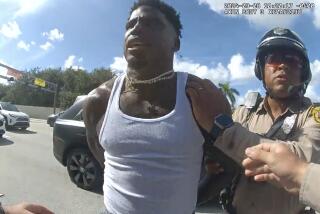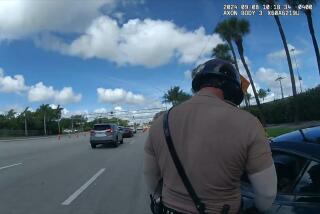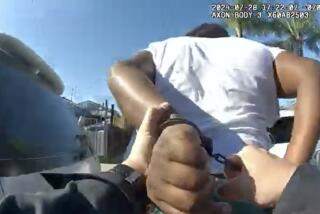Officer Backs Defendants in King Case : Courts: Witness called by prosecution defends actions of police at the scene. But he testifies that Briseno had angrily said Sgt. Koon should have handled the arrest better.
- Share via
A prosecution witness in the Rodney G. King civil rights trial testified Tuesday that none of the Los Angeles police officers involved in King’s arrest did anything wrong and that although several baton blows may have struck King in the head, they all appeared to be accidental.
The witness, Officer Rolando Solano, defended the actions of his fellow officers and said that Assistant U.S. Atty. Steven D. Clymer had threatened him with perjury charges if he refused to reconsider his version of the incident, which does not correspond with a videotape of it.
Solano’s testimony appeared to be a sharp setback for prosecutors, who had called the officer to the stand only to turn on him and suggest that he lied to Police Department investigators.
The result was a confused presentation that may have laid the groundwork if government lawyers choose to argue that a police “code of silence” has thwarted the investigations of the King beating, but it also featured prosecutors offering some of Solano’s testimony as evidence while simultaneously suggesting that he was not to be trusted.
Defense lawyers were jubilant.
“They put a land mine right in the middle of their case,” said Harland W. Braun, the lawyer for Officer Theodore J. Briseno.
Michael P. Stone, who represents Officer Laurence M. Powell, agreed.
“This is a roller coaster we’re all on. They’ll be back,” Stone said. But he added with a wide grin: “They had a bad-hair day today.”
Some legal analysts also were mystified by Solano’s appearance for the prosecution and said it appeared the government had squandered the momentum that it had built during the first three days of its case. But some of those analysts, including UCLA law professor Peter Arenella, also stressed that the prosecution still has dozens of witnesses to call, including King, and that Solano’s testimony did help the government’s case in a few important respects.
Most significantly, Solano told jurors of a conversation with his partner, Briseno, a few minutes after King was arrested. Solano said that he and Briseno were in their police car when an angry Briseno turned to him, saying “words to the effect of, ‘The sergeant should have handled it better.’ ”
Sgt. Stacey C. Koon, the supervising officer at the scene, is charged along with Briseno, Powell and Timothy E. Wind in the federal case.
Over the objections of defense lawyers, U.S. District Judge John G. Davies ruled Tuesday that the statement is admissible as evidence in the case. He added, however, that the jury should not be allowed to consider Briseno’s alleged statement when considering the charges against Koon. It may only be used against Briseno, Davies ruled.
In return for that comment and a few other details that Solano offered, prosecutors were subjected to Solano’s version of the beating and his assessments of the other officers. Solano told jurors he was frightened by King’s behavior and had drawn his gun because he considered it a high-risk situation.
Solano confirmed that he had told police investigators that a few of Powell’s blows appeared to hit King in the head. But, in response to questions from Powell’s lawyer, Solano said those blows all appeared to be aimed at King’s arms and shoulders and only hit his head by mistake.
Solano, who received a 22-day suspension from the Police Department for his involvement in the beating, stressed several times that he believes no officer did anything wrong.
“Did you observe any misconduct?” asked Ira Salzman, Koon’s lawyer.
“No,” Solano answered.
“Did you see any officer do anything improper?” Salzman asked.
“No,” Solano said.
In addition to giving his account of the beating, Solano also testified about his appearances before a federal grand jury and about his interviews by federal prosecutors. Specifically, he told jurors that Clymer had threatened to charge him with perjury because Clymer did not believe that Solano was telling the truth about what he saw during the beating.
“Did he ever explain why he called you as his witness even though he thought you were a perjurer?” Braun asked Solano.
“No, he did not,” Solano said, adding that he did not change his testimony even after Clymer threatened to have him indicted.
Questioned again by Clymer, Solano conceded that his memory of the incident does not square with the videotape. He blamed the discrepancies on the stress of the arrest and on “tunnel vision” that prevented him from seeing everything going on around him.
After Solano finished testifying, two more civilian witnesses to the beating were called to the stand, and both said they never saw King pose a threat to the officers who beat him. Benjamin Avila and Felipe Lopez, both of whom are members of a musical group called Banda El Rincon, were in the band’s bus across the street from the incident.
Avila and Lopez told jurors that King had placed his hands on top of his car after being pulled over by police. That contradicts the account offered by Solano, who said that King waved his hands up and down, never quite complying with police fully.
Avila said that after seeing King with his hands on his car, he lost sight of him for a moment, then turned again and saw officers pummeling him.
“They were kicking him,” Avila said. “They were hitting him with things they had in their hands.”
Lopez echoed many of the details in Avila’s account. But some of the details are not corroborated by the videotape of the beating, and defense lawyers, particularly Salzman, aggressively challenged the credibility of the two witnesses, suggesting that their testimony had been influenced by watching the videotape.
More to Read
Sign up for Essential California
The most important California stories and recommendations in your inbox every morning.
You may occasionally receive promotional content from the Los Angeles Times.






![Vista, California-Apri 2, 2025-Hours after undergoing dental surgery a 9-year-old girl was found unresponsive in her home, officials are investigating what caused her death. On March 18, Silvanna Moreno was placed under anesthesia for a dental surgery at Dreamtime Dentistry, a dental facility that "strive[s] to be the premier office for sedation dentistry in Vitsa, CA. (Google Maps)](https://ca-times.brightspotcdn.com/dims4/default/07a58b2/2147483647/strip/true/crop/2016x1344+29+0/resize/840x560!/quality/75/?url=https%3A%2F%2Fcalifornia-times-brightspot.s3.amazonaws.com%2F78%2Ffd%2F9bbf9b62489fa209f9c67df2e472%2Fla-me-dreamtime-dentist-01.jpg)







